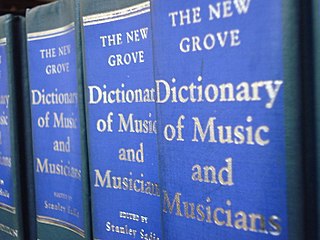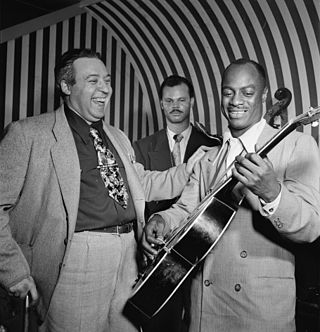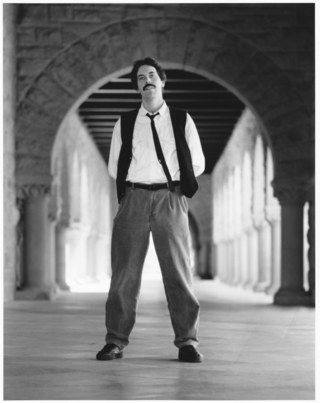Related Research Articles
Free jazz or Free Form in the early- to mid-1970s is a style of avant-garde jazz or an experimental approach to jazz improvisation that developed in the late 1950s and early 1960s when musicians attempted to change or break down jazz conventions, such as regular tempos, tones, and chord changes. Musicians during this period believed that the bebop and modal jazz that had been played before them was too limiting, and became preoccupied with creating something new. The term "free jazz" was drawn from the 1960 Ornette Coleman recording Free Jazz: A Collective Improvisation. Europeans tend to favor the term "free improvisation". Others have used "modern jazz", "creative music", and "art music".

The New Grove Dictionary of Music and Musicians is an encyclopedic dictionary of music and musicians. Along with the German-language Die Musik in Geschichte und Gegenwart, it is one of the largest reference works on the history and theory of music. Earlier editions were published under the titles A Dictionary of Music and Musicians, and Grove's Dictionary of Music and Musicians; the work has gone through several editions since the 19th century and is widely used. In recent years it has been made available as an electronic resource called Grove Music Online, which is now an important part of Oxford Music Online.

Stephen Johnson Turre is an American jazz trombonist and a pioneer of using seashells as instruments, a composer, arranger, and educator at the collegiate-conservatory level. For sixty years, Turre has been active in jazz, rock, and Latin jazz – in live venues, recording studios, television, and cinema production.

Maria Lynn Schneider is an American composer and jazz orchestra leader who has won multiple Grammy Awards.
Stanley John Sadie was an influential and prolific British musicologist, music critic, and editor. He was editor of the sixth edition of the Grove Dictionary of Music and Musicians (1980), which was published as the first edition of The New Grove Dictionary of Music and Musicians. Along with Thurston Dart, Nigel Fortune and Oliver Neighbour he was one of Britain's leading musicologists of the post-World War II generation.

Hugues Panassié was a French critic, record producer, and impresario of traditional jazz.

Walter Dewey Redman was an American saxophonist who performed free jazz as a bandleader and with Ornette Coleman and Keith Jarrett.

European free jazz is a part of the global free jazz scene with its own development and characteristics. It is hard to establish who are the founders of European free jazz because of the different developments in different European countries. One can, however, be certain that European free jazz took its development from American free jazz, where musicians such as Ornette Coleman revolutionised the way of playing.

Ralph Joseph P. Burns was an American jazz pianist, composer, and arranger.
Marjorie Hyams was an American jazz vibraphonist, pianist, and arranger. She began her career as a vibraphonist in the 1940s, playing with Woody Herman, the Hip Chicks (1945), Mary Lou Williams (1946), Charlie Ventura (1946), George Shearing, and led her own groups, including a trio, which stayed together from 1945 to 1948, performing on 52nd Street in Manhattan. The media, marquees, and promos often spelled her first name "Margie", but she insisted that it was spelled with a "j".
Herbert Bickford "Herbie" Steward was an American jazz saxophonist. He was widely known for being one of the tenor saxophone players in Four Brothers, part of Woody Herman's Second Herd.
Martin Tudor Hansford Williams was an American jazz critic and writer.

Fess Williams(néStanley R. Williams; April 10, 1894 – December 17, 1975) was an American jazz musician.

Ted Gioia is an American jazz critic and music historian. He is author of eleven books, including Music: A Subversive History, The Jazz Standards: A Guide to the Repertoire, The History of Jazz and Delta Blues. He is also a jazz musician and one of the founders of Stanford University's jazz studies program.

Craig Mitchell Handy is an American tenor saxophonist.

Pheeroan akLaff is an American jazz drummer and percussionist. He began playing in his hometown of Detroit, Michigan and Ann Arbor, with R & B keyboardist Travis Biggs, funk keyboardist Nimrod “The Grinder” Lumpkin, The Ebony Set and The Last Days. He moved to New Haven, Connecticut, and formed a group with saxophonist/flautist/percussionist Dwight Andrews. He debuted with saxophonist Bill Barron in 1975, followed by a tenure in Leo Smith's ‘New Dalta Ahkri’ (1977-1979).

Hal McIntyre was an American saxophonist, clarinetist, and bandleader.
Arthur Relsmond "Skeets" Herfurt was an American jazz saxophonist and clarinetist.
Lyndon Van Christie was an Australian-born American-based jazz bassist. He earned a medical degree from Otago Medical School, New Zealand, and, while practising as a physician in Sydney from 1961, played in the local jazz scene until he moved to New York City in 1965.
Eric Sinclair Traill was a British publisher, chief editor, and music critic of jazz. His career began in 1946, when he launched Pick Up as a locus for serious jazz criticism in Britain. In May 1948, Traill, using his own money, founded Jazz Journal and, for the rest of his life, served as its editor in chief. Jazz historian Roberta Schwartz states that Jazz Journal was not a new publication, but rather a name change for Pick Up.
References
- ↑ Multiple sources:
- Contemporary Authors, New Revision Series, Vol. 135, Thomson Gale Detroit (2005) OCLC 6921683
- Contemporary Authors, Vol. 161, Gale Research, Detroit (1998) OCLC 6921683
- The Writers Directory, St. James Press, Detroit OCLC 1776757
- International Who's Who in Music and Musicians' Directory; 12th edition, 1990–1991, International Who's Who in Music, Cambridge, England (1990) OCLC 632053332
- Who's Who in America, 60th edition, 2006, Marquis Who's Who, New Providence, NJ (2005) OCLC 62401678
- ↑ Stephen Holden, "The Pop Life: Jazz Facts and Figures", The New York Times , November 23, 1988.
- ↑ John S. Wilson, "Books of The Times; Updating the Minutiae of a Truly American Sound", The New York Times, December 30, 1988.